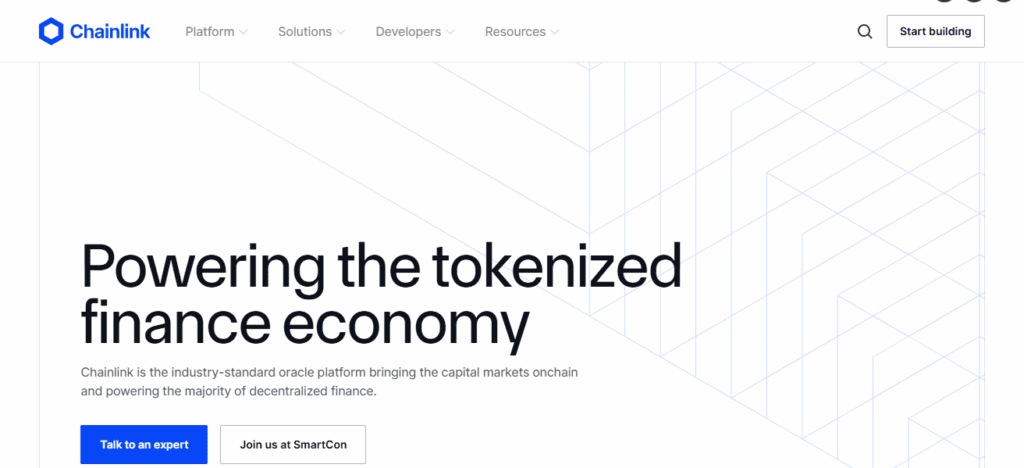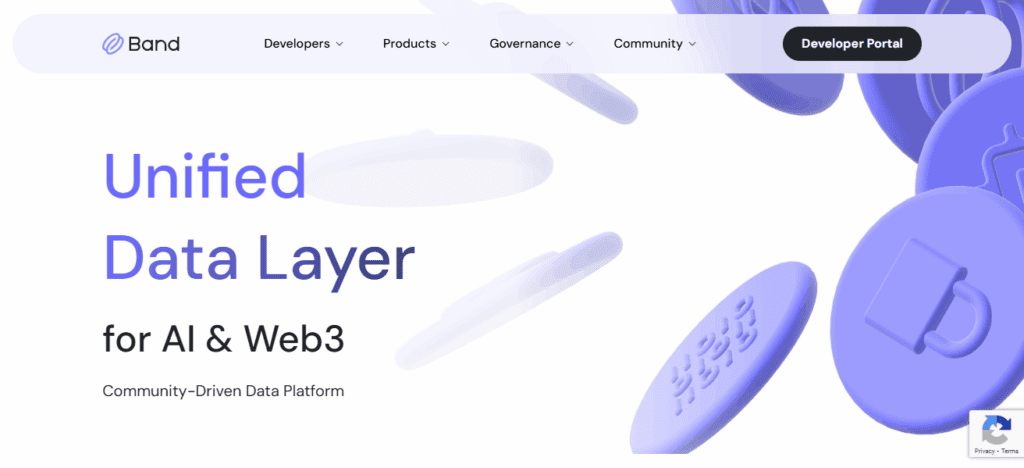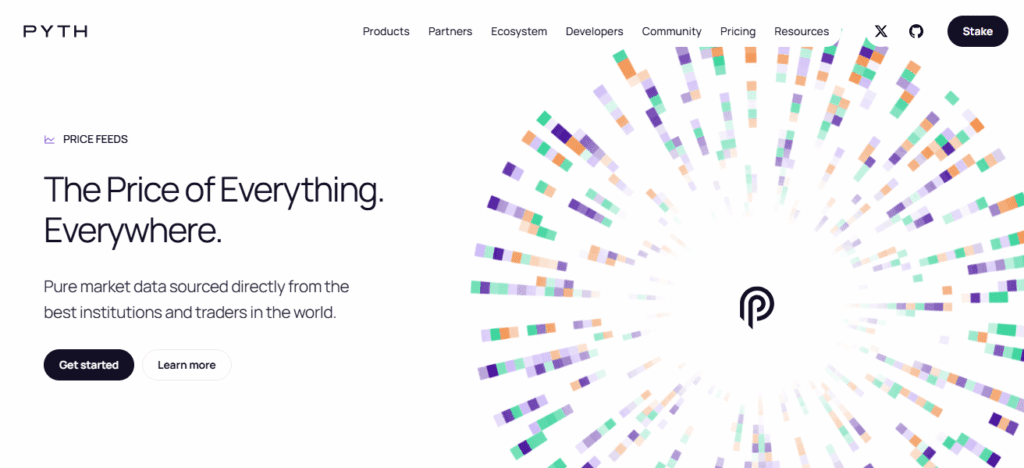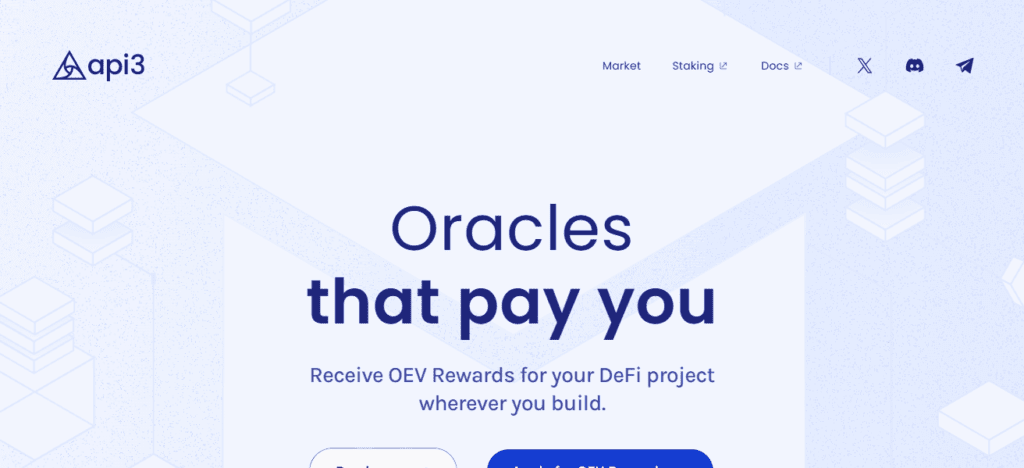Yield farming can be tailored with the help of oracles, helping users in DeFi optimize earnings using dependable, up-to-date information.
Utilizing oracles such as Band Protocol or Chainlink enables smart contracts to change yields, liquidity provisions.
Collateral and incentive ratios in real time through automated systems. Efficient, low-risk, and highly dynamic yield farming in DeFi can be pursued through data farming.
What Are Oracles in DeFi?
In DeFi, oracles are systems that connect blockchain smart contracts to real-world or off-chain data.
Since blockchains can’t access external information on their own, oracles act as trusted bridges, delivering verified data like asset prices, interest rates, or weather and economic indicators.
This real-time information allows smart contracts to execute with precision and safety. For instance
Oracles are used in yield farming protocols to modify rewards in accordance with token value or changes in the market.
Prominent oracle networks like Chainlink, Band Protocol, and Pyth Network provide critical support to the DeFi ecosystem by sustaining decentralized, immutable data streams.
How To Set Up Specialized Yield Farming With Oracles
Step-by-Step Setup for Specialized Yield Farming with Oracles (Using Chainlink)

Choose a Blockchain Platform
Identify a blockchain platform that supports smart contracts such as Ethereum or BNB Chain while also being compatible with Chainlink oracles.
Design Your Yield Farming Protocol
Construct farming pools along with their respective rewards and tokenomics. Your smart contracts must work with the oracle and market yield-adjusting contracts.
Integrate Chainlink Price Feeds
Incorporate Chainlink price feeds and obtain your assets. This secures your protocol’s protection and reaction towards market changes in price manipulation.
Deploy Smart Contracts
Using Solidity, code and deploy your smart contracts. You must create mechanisms that adjust APY according to liquidity, volatility and oracle data.
Set Up Oracle Fail-safes
Having fallback mechanisms for oracle failure is crucial. Multiple data sources or time-weighted averages can be used to avert exploitative price feeds.
Testing on a Testnet
Try out your protocol on a testnet such as Sepolia. Before going live, simulate oracle inputs and then adjust and test yields for robustness and security.
Launch with Liquidity Mining
Provide yield incentives to gain the attention of liquidity providers and then reward participants with Chainlink oracle-based incentives that auto-adjust to shifting pool conditions and external factors.
Monitor the Performance of the Oracle
Keep an eye on the precision and the delay of the oracle feeds. Chainlink has excellent monitoring, but you might want to build your own monitoring to close the loop and safe your protocol.
Smart Contract Audits
Obtain third-party audits to check oracle integration and yields for logic errors and broken assumptions. Pay attention to how external data flows into your farming rewards in order to ensure complete control.
Scaling and Optimization
With increasing usage, there will be more opportunities to optimize cost and performance. Look into Layer 2 options or Chainlink low latency feeds for better gas cost performance and systems scalability.
What role do oracles play in yield farming?
Oracles serve critical functions as the connections between smart blockchain contracts and off-the-chain or real-world data.
When engaged in yield farming, oracles provide real-time, reliable data needed such as crypto value, lending and interest rates and even weather info.
Such real-time data allows smart contracts to automatically change reward rates, adjust the collateral necessary, and change liquidity incentive optimizations depending on the prevailing market conditions.
By facilitating real-time changes in yield farming protocols, oracles provide greater efficacy and lower exposure to risk and make DeFi systems more transparent and more responsive to the prevailing economic conditions.
How Oracles Enhance Yield Farming
- Reliable price feeds: Keeps farming pools from experiencing liquidation or mispricing.
- Variable dynamic rewards: Yield rates adjust automatically to changes in external market conditions.
- Cross-chain farming: Oracles allow farming to be done on different blockchains.
- Risk management: Responds to changing market conditions with adaptive strategies.
- An example use case: A yield farm that changes liquidity incentives according to the ETH volatility index.
What are some popular Oracle providers that can be used?
Band Protocol
Band Protocol’s Cross-chain decentralized oracle network offers incredible and bespoke, scalable, and customizable data feeds across different blockchains.
Band Protocol aggregates data from numerous reputable sources and feeds it to smart contracts utilizing its BandChain architecture.

DeFi, gaming, and prediction markets developers can utilize custom oracle scripts and adapt them to Band Protocol use cases.
Band Protocol provides enhanced and streamlined seamless integration with the Cosmos and Ethereum networks, enabling decentralized applications and yield farming systems to provide reliable, real-time, and inexpensive data.
Pyth Network
Pyth’s specialization lies in delivering high-frequency and low-latency data to blockchain applications. As the data is sourced in real-time from top trading firms, exchanges, and market makers, the data is reliable.
It is particularly built for DeFi protocols where instant price updates are required, and where price manipulation and delays need to be mitigated, such as derivatives, lending platforms, and dynamic yield farms.

It improves the smart contracts reliability which in turn improves performance by publishing the data on-chain at sub-second intervals. This feature is important in high-speed, data-sensitive decentralized finance environments.
API3
API3 functions as a decentralized oracle solution linking smart contracts with real-world data through first-party APIs.
Instead of relying on third parties, data providers run decentralized APIs (dAPIs), directly serving their clients’ needs.
This approach significantly reduces cost and data dependency risks. Furthermore, API3 enhances data integrity for DeFi platforms, yield farms, and insurance protocols.

Developers can easily integrate with Airnode. This lightweight middleware enhances the developer experience.
API3 minimizes trust and risk by permitting data providers to directly supply authenticated data. This strengthens the oracle ecosystem.
Risk Management and Security Considerations
Strategies for Prevention of Oracle Manipulation Attacks: Use decentralized data sources, time-weighted averages, and layers of security for trust, and prevent data manipulation and tampering.
Value of Aggregating Data from Various Sources: Combine several data feeds from independent oracles to decrease inaccuracies, lower manipulation potential, and improve the trustworthiness of yield farming smart contracts.
Fail-safes on Oracles and Smart Contract Audits: To protect critical DeFi yield operations from the consequences of a lack of smart contract audits, coding mistakes, or downtime, ensure the installation of backup oracles.
Outlining On-chain Oracle References for Transparency: Provide all oracles and update histories on-chain so users can see where the data is sourced and trusted for yield computations.
Advanced Use Cases of Oracle-Driven Yield Farming
RWA farming utilizing oracle price feeds
Tokenized assets generate yields based on real-world price information received from reliable sources.
Weather-indexed yield strategies for agri-backed DeFi projects
Rewards for farming automatically modify according to oracle-reported weather conditions.
Cross-chain yield optimization via oracles for bridge data
Oracles provide data centralization across several blockchains, promoting effective multi-chain yield generation.
Dynamic stablecoin collateral ratios powered by oracles
With every oracle update, market data and collateral levels shift automatically to keep pace.
Future of Oracle-Based Yield Farming
Expanding use of predictive yield adjustment using AI-integrated oracles: Advanced AI makes oracles even more precise, automating the optimization of yield adjustment.
Expansion into real-world asset tokenization and hybrid DeFi systems: Integrating DeFi with oracles and physical assets fusion makes adopts broad use at hybrid systems.
Opportunities for developers and investors: Developers are incentivized when they design, finance, and grow protocols based on oracles.
Conclusion
In conclusion, Specialized yield farming with oracles represents the next evolution of DeFi, enabling smarter, data-driven, and automated earning strategies.
By integrating reliable oracle networks like Chainlink or Band Protocol, farmers can dynamically adjust yields based on real-world data.
This innovation enhances transparency, efficiency, and security—empowering investors to optimize rewards while minimizing risks in decentralized ecosystems.
FAQ
Advanced DeFi strategy using data-driven mechanisms to optimize rewards dynamically.
A service connecting smart contracts to real-world or off-chain data.
They enable automated adjustments, improve accuracy, and reduce risk.
By supplying real-time data to smart contracts that modify rewards.
For custom farms, yes; ready-made platforms often require no coding.













Got a Questions?
Find us on Socials or Contact us and we’ll get back to you as soon as possible.